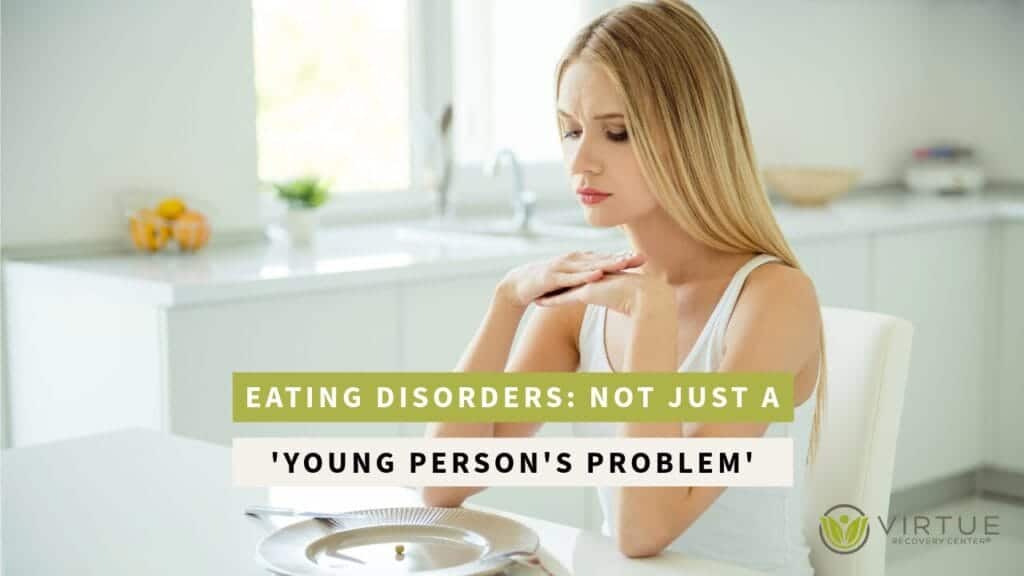
Table of Contents
Key Takeaways
Eating Disorders Across All Ages: Contrary to common belief, eating disorders affect individuals beyond the young demographic, necessitating tailored treatments for diverse age groups. Mental Health and Eating Disorders Interconnection: The complex relationship between mental health and eating disorders, with psychological factors like control, self-esteem, and emotional coping playing a significant role. Importance of Intensive Outpatient Programs (IOPs): IOPs provide a flexible yet comprehensive approach to treatment, balancing rigorous therapy with the ability for patients to maintain daily routines. Rising Prevalence of Eating Disorders in Youth: Highlighting alarming statistics indicating a significant increase in eating disorders among young people, emphasizing the need for effective interventions. Impact of Societal Factors on Eating Disorders: Understanding how societal pressures and cultural factors contribute to the rise in eating disorders, particularly among youth. Importance of Holistic Healing: This method integrates physical, emotional, mental, and spiritual aspects of health, aiming to align any imbalances with their natural functioning state.A Misunderstood Health Issue
Eating disorders, often perceived as a health issue predominantly affecting younger populations, actually span across all age groups. This misconception can lead to underdiagnosis or misdiagnosis in older individuals, hindering their access to appropriate care. Virtue Recovery Center recognizes this gap and addresses eating disorders in people of all ages, understanding that these complex conditions can manifest at any stage of life. The prevalence of eating disorders among young people has shown a significant and concerning increase in recent years. In 2023, a staggering 12.5% of 17 to 19-year-olds in England were reported to be living with an eating disorder, a sharp rise from just 0.8% in 2017. The figures for the 11 to 16-year-olds were 2.6% in 2023 compared to 1% in 2017. This increase is notably higher among girls and young women. For instance, in the 11-16 age group, the prevalence of eating disorders was four times higher in girls (4.3%) compared to boys (1.0%). Among 17-19-year-olds, the figures were even more stark, with 20.8% of young women having an eating disorder compared to 5.1% of young men. Additionally, a broader view of adolescent eating disorders has led to a rise in hospitalization rates, which have climbed six- to seven-fold since 2010. This includes young people treated for atypical anorexia, who are not underweight at diagnosis but have undergone rapid weight loss, and those with avoidant/restrictive food intake disorder (ARFID), a condition recognized in 2013 where patients struggle to eat enough for reasons not related to body image. These statistics highlight a growing public health concern, underscoring the need for increased awareness, early intervention, and effective treatment strategies for eating disorders among young people.The Mental Health Connection
The relationship between eating disorders and mental health is complex and deeply intertwined. These disorders are far more than issues related to food; they are intrinsically linked to psychological factors. Elements such as a need for control, low self-esteem, and using disordered eating as a coping mechanism for emotional distress are central to understanding these conditions. These disorders stem from deeper mental health issues rather than just dietary choices or habits. In addressing these disorders, comprehensive mental health care becomes essential. The treatment of eating disorders is not just about addressing dietary habits but also involves tackling the underlying mental health issues that contribute to the condition. This is where the role of specialized programs, like those offered at Virtue Recovery Center, becomes crucial. They provide dual-diagnosis treatment, which simultaneously addresses the complexities of mental health issues alongside eating disorders. This concurrent approach is vital for effective treatment, ensuring that both aspects of the disorder are treated in tandem.Intensive Outpatient Programs: A Flexible Solution
Eating disorders and mental health are inextricably linked, reflecting deep psychological complexities rather than a simple preoccupation with food. These disorders often stem from underlying psychological issues, including the need for control, self-esteem struggles, and mechanisms to cope with emotional distress. It’s a multifaceted problem where focusing on food is just the tip of the iceberg, and underlying it are emotional and psychological challenges. Recognizing this intricate connection, comprehensive mental health care becomes essential in effectively addressing eating disorders. This is where the approach of facilities like Virtue Recovery Center becomes crucial. They offer specialized dual-diagnosis treatment programs that tackle both eating disorders and associated mental health conditions simultaneously. By doing so, they provide a more holistic and effective treatment strategy that addresses the symptoms and the root causes of these disorders.
People of all ages can suffer from an eating disorder.
The Role of Holistic Healing
Holistic healing is an approach that seeks to address the overall well-being of an individual, encompassing physical, emotional, mental, and spiritual health. It goes beyond treating symptoms, focusing on aligning imbalances with their natural state. This method acknowledges that the root cause of physical illness might be non-physical and aims for a comprehensive rebalance. The holistic healing process views health as an overall state of being, either in or out of balance, and aims to facilitate the natural flow of energy throughout the body. It’s considered more effective as it leads to long-term positive changes and improves overall quality of life. In understanding the path to recovery from eating disorders, it’s crucial to recognize that treating symptoms alone is not sufficient. A holistic approach is imperative, one that considers the individual’s complete well-being. This comprehensive strategy encompasses medical and psychological treatments and extends to modifying lifestyle choices, dietary guidance, and developing a robust support network. Such an approach is vital because eating disorders are not just physical ailments; they are complex conditions with psychological and emotional dimensions. Addressing these various aspects concurrently ensures a more effective and sustainable recovery. Many centers that focus on treating eating disorders have integrated this holistic philosophy into treatment plans. By doing so, they provide a more rounded and thorough healing process. Many of their programs go beyond conventional treatment methods, offering a blend of medical care, psychological support, and lifestyle interventions. This includes nutritional counseling, critical in rebuilding physical health, and therapy sessions to resolve underlying emotional and psychological issues. The center’s commitment to this comprehensive approach underlines its dedication to alleviating symptoms and fostering long-term wellness and recovery.Is There a Connection Between Eating Disorders and Substance Abuse in Young Adults?
The intricate relationship between eating disorders and substance abuse in young adults is alarming. Many individuals struggling with body image issues may turn to drugs to cope. This often leads to a cycle of harmful behaviors, emphasizing the need for understanding lean abuse and codeine addiction issues to foster healthier recovery paths.
Innovative Treatments at Virtue Recovery Center
At Virtue Recovery Center, treatment goes beyond traditional methods. Their programs incorporate the latest in evidence-based therapies tailored to each individual’s unique needs. This personalized approach ensures that each client receives the most effective treatment for their specific situation, be it for an eating disorder, mental health issue, or both.FAQ
Q: What is the prevalence of eating disorders among young people? A: Recent statistics show a significant increase in eating disorders among young people. For instance, 12.5% of 17 to 19-year-olds in England were living with an eating disorder in 2023, up from 0.8% in 2017. Q: Are eating disorders only a problem for young people? A: No, eating disorders are not confined to young people. They can affect individuals of all ages, although there’s a common misconception that they primarily affect adolescents. Q: How are eating disorders and mental health related? A: Eating disorders are deeply intertwined with mental health, often rooted in psychological issues like control, self-esteem, and coping mechanisms for emotional distress. Effective treatment requires addressing these underlying mental health concerns. Q: What is holistic healing, and how does it relate to eating disorders? A: Holistic healing is an approach that treats the whole person – physically, emotionally, mentally, and spiritually – rather than just addressing the symptoms. This approach is crucial in treating eating disorders, encompassing all aspects of an individual’s health. Q: What kind of treatments are available for eating disorders? A: Treatments for eating disorders vary but often include a combination of psychological therapy, nutritional education, and medical monitoring. Programs like those at Virtue Recovery Center offer comprehensive care, including dual diagnosis treatment for concurrent mental health issues. Q: Can eating disorders lead to other health complications? A: Yes, eating disorders can lead to serious health complications, including heart issues digestive problems, and in severe cases, can be life-threatening. Q: Is recovery from an eating disorder possible? A: Yes, recovery from an eating disorder is possible, especially with early intervention and a comprehensive treatment approach that addresses both the eating disorder and any underlying mental health issues. Q: What role do family or support networks play in recovery? A: Family and support networks play a crucial role in recovery. Supportive environments and understanding from loved ones can significantly aid healing. Q: How can one identify if someone is suffering from an eating disorder? A: Some signs of eating disorders include drastic weight loss or gain, obsession with food and body weight, eating in secrecy, and drastic changes in eating habits. However, symptoms can vary widely.Sources
National Eating Disorders Association (NEDA), “Statistics & Research on Eating Disorders.” This source provided statistics on the prevalence of eating disorders among college athletes and young people in general. National Eating Disorders Association Scope Blog, Stanford Medicine, “More kids are being hospitalized for eating disorders – researchers learned why.” This source offered insights into the increasing hospitalization rates for adolescent eating disorders and the broadening view of these conditions. Scope – Stanford Medicine Place2Be, “Eating Disorders in Children and Young People: a major public health concern.” This article gave detailed statistics on the prevalence of eating disorders among young people in England post-Covid-19 pandemic. Place2Be My Holistic Healing, “What is Holistic Healing?” This resource was used to define and explain the concept of holistic healing in the context of treating eating disorders and mental health. My Holistic HealingAre You Covered For Treatment?
At Virtue Recovery Center, we understand the importance of accessible care. That’s why we’re in-network with numerous private insurance companies, ensuring that your journey to recovery is supported from the start. Let us help you quickly and easily verify your insurance coverage. Begin your path to healing today.
- About the Author
- Latest Posts
Gigi Price( Clinical Director )
Gigi Price holds licenses as a Master Social Worker and Clinical Drug Counselor. She completed her master’s degree in Social Work at Texas State University. Over the last decade, Gigi has been dedicated to utilizing evidence-based practices to enhance patient care and treatment planning, resulting in positive, long-term outcomes for patients and their families. Her passion lies in creating a treatment environment where professionals collaborate to bring about positive change and provide a safe, trustworthy therapeutic experience. Patients can be confident in receiving top-quality care under her leadership.
In her role as the Clinical Director of Virtue Recovery Houston, Gigi conducted research to identify the most effective approaches for treating patients with acute mental health diagnoses, PTSD, and Substance Use Disorder. She then assembled a team of skilled clinicians who could offer various therapeutic modalities, such as Cognitive Behavioral Therapy (CBT), Dialectical Behavioral Therapy (DBT), Acceptance and Commitment Therapy (ACT), Somatic Exposure, Eye Movement Desensitization and Reprocessing (EMDR), and Cognitive Processing Therapy (CPT). Gigi takes pride in overseeing the development and implementation of Virtue Houston’s Treatment Program, which includes two specialized therapeutic curricula tailored to the unique needs of individuals struggling with mental health issues, addiction, and PTSD.
How Cognitive Behavioral Therapy Supports Lasting Sobriety After Cocaine Addiction …
How an Eating Disorder Program Helps Manage Binge-Eating Episodes Key …
Key Takeaways Regular exercise reduces cravings and withdrawal symptoms. Physical …
Key Takeaways Veterans Day began as Armistice Day in 1918 …
Key Takeaways Proper nutrition plays a vital role in addiction …
Key Takeaways Long-term sobriety is achievable with evidence-based addiction treatment …


























